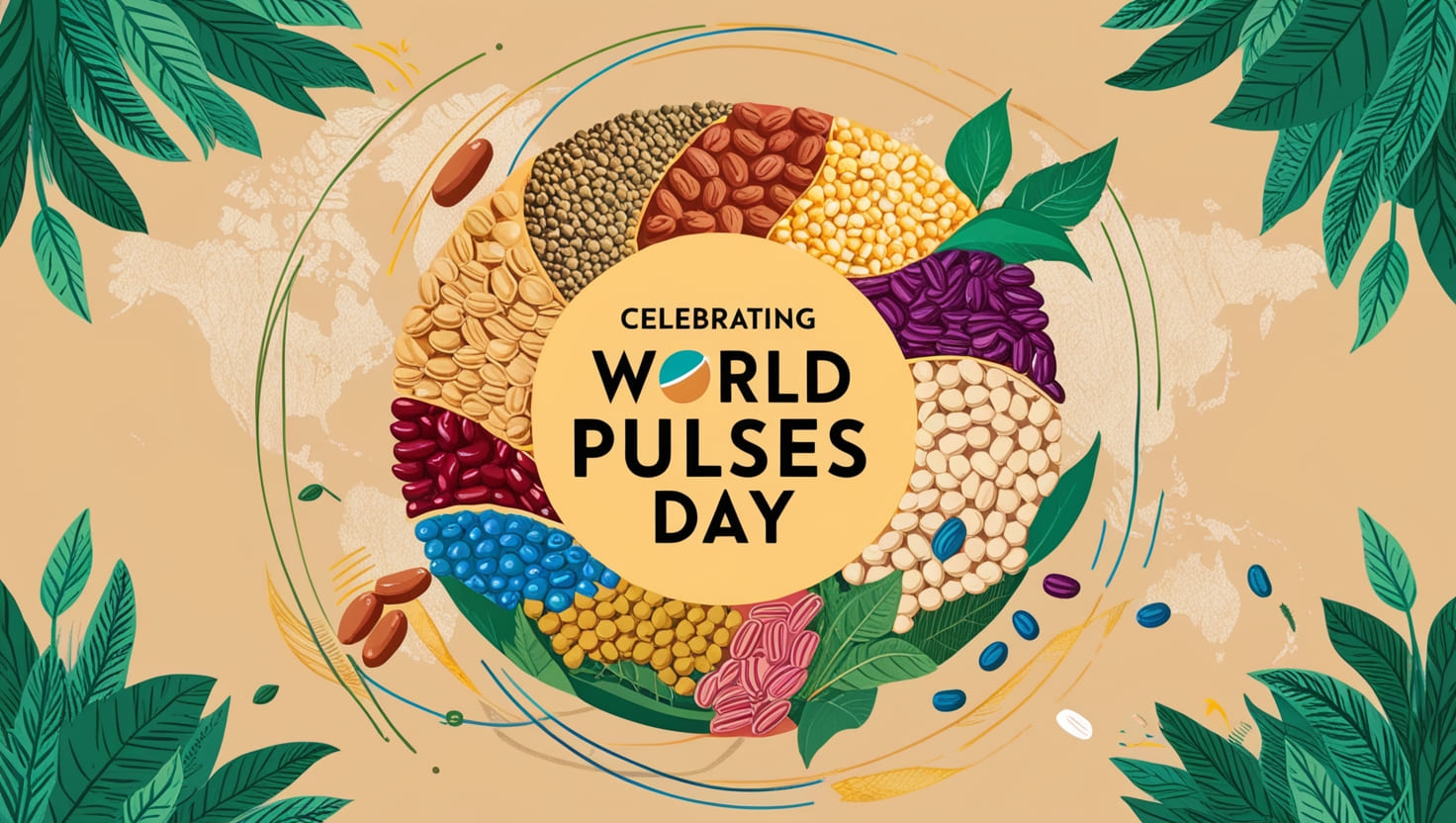
World Pulses Day is celebrated on 10 February, as designated by the United Nations General Assembly. This day emphasizes the vital role of pulses—like chickpeas, lentils, and dry beans—grown from leguminous plants, which are key sources of nutrition for both people and animals worldwide.
World Pulses Day is celebrated each year by the United Nations Food and Agriculture Organization (FAO). For 2025, the theme, as set by the United Nations, is Pulses: Bringing Diversity to Agrifood Systems. This theme highlights how pulses contribute to both above-ground and below-ground biodiversity.
Pulses not only provide essential nutrients but also play a significant role in promoting healthier diets and sustainable agricultural practices. They are an essential food source, particularly for vulnerable communities.
For farmers, pulses are a valuable crop that can be consumed and sold, supporting food security for families and contributing to economic stability.
The world observes World Pulses Day on the 10th of February each year to raise awareness of the nutritional value of pulses in food across the globe, sustainable agriculture, and food security. Lentils, chickpeas, beans, and peas are some of the pulses that have been food ingredients worldwide for thousands of years. Pulses contain a lot of protein, fibre, and essential nutrients and are an excellent ingredient in a healthy diet.
Pulses are not only healthy, but they are also eco-friendly. Pulses save water, improve soil health and release fewer carbon emissions into the atmosphere than most other crops. To remember their contribution towards combating hunger, malnutrition, and climate change, World Pulses Day raises awareness of high consumption and the value of their contribution.
Pulses are sometimes considered a superfood because of their incredible nutritional value. They are an excellent plant source of protein and, therefore, an excellent choice for vegetarians and vegans. With high protein content, they can also be an excellent alternative to meat, causing muscle growth and overall health.
Pulses also have an excellent quantity of dietary fibre, which improves digestion, balances blood sugar levels, and keeps one complete for extended periods. They are also packed with essential vitamins and minerals such as iron, folate, magnesium, and potassium, contributing to improved heart health, brain function, and overall well-being.
Another vital advantage of pulses is that they are low-fat and gluten-free, making them an excellent choice for those with gluten intolerance and those interested in heart-friendly foods. Consuming pulses has been shown to lower cholesterol, reduce the risk of heart disease, and maintain weight.
One of the main reasons pulses are being marketed worldwide is their role in sustainable farming. Unlike crops, pulses require much less water, making them an excellent food source during drought. For example, it takes much less water to produce a kilogram of lentils than raising the same quantity of meat or rice.
Pulses also improve the health of the soil. As natural nitrogen fixers, pulses replenish the health of the soil by filling it with rich nutrients, reducing the need for chemical fertilisers. Not only is this beneficial for the farmers, but it also decreases the environmental pollution from runoff chemicals.
In addition, pulses reduce greenhouse gas emissions. Contrary to the high emissions from animal production, the growth of pulses leaves a much smaller carbon footprint. By using pulses more often, we can assist in reducing the strain on the environment and developing a better sustainable food system.
Pulses play a crucial role in food security throughout the world. As populations continue to grow and scares of shortage increase, pulses are an affordable, nutritious, and resilient food for millions of individuals worldwide.
In developing countries, where access to protein foods such as meat and dairy is limited, pulses are an adequate alternative. Pulses are easy to store, have a long shelf life, and can be added to various foods, making them a sufficient food source for areas subject to economic and environmental challenges.
Pulses also combat malnutrition by providing nutrients to aid growth and development, especially for children and pregnant women. Highly adaptable, they can be added to varied diets, filling various cultural foods and food choices.
Incorporating pulses into daily meals is simple, delicious, and fulfilling. Pulses can be added to soups, salads, curries, stews, and snacks. Lentils can be an excellent base for comfort soups, chickpeas can be used to make hummus or add to wraps, and beans can replace meat in tacos and burgers. Even baked goods can be made using pulse-based flour, offering a gluten-free alternative to standard wheat flour.
For individuals who wish to eat healthy or transition towards a more plant-based diet, pulses offer an easy way to increase protein content and cut down on processed food. Whether in traditional foods such as Indian dal, Middle Eastern falafel, or Mexican refried beans or in new foods such as smoothie bowls with chickpea flour pancakes, the possibilities are endless.
World Pulses Day is a celebration and a reminder of how these small but mighty seeds lead to healthier living, a sustainable environment, and global food security. Pulses are affordable, nutrient-dense, and eco-friendly, essential to creating a sustainable future.
By adding more pulses to meals, advocating for sustainable agriculture practices, and sharing the word, we can make a difference in our and the world's health. As we celebrate World Pulses Day, thank them for feeding people and the planet and encourage others to add them to their plates.

JAIN PU College, a part of the renowned JGI Group, is committed to empowering students with quality education.
Beyond academics, the college ensures its online content reflects the same standard of excellence. Every blog and article is meticulously vetted and proofread by subject matter experts to ensure accuracy, relevance, and clarity. From insightful educational topics to engaging discussions, JAIN PU College's content is crafted to inform, inspire, and add value to its readers, reflecting the institution's commitment to intellectual growth and innovation.
View all Blogs